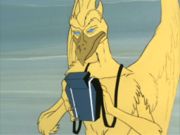User:Canreb/ILI work page
| This user page is undergoing an expansion or major revamping. However, you are welcome to assist in its construction by editing it as well. Comments regarding possible improvements are welcome on the articles talk page. |
Aurelian
| Intelligent Lifeform Index |
|---|
| Canreb/ILI work page | |
|---|---|

| |
| Four Letter Code | AURE |
| Federation Status | Neutral |
| Planet of Origin | Aurelia |
| Encountered | TAS: Yesteryear |
| T/E Rating | T0/E0 |
| Current Tech Level | Planetary Development Scale |
| List of Named Canreb/ILI work pages | |

| |
Full ILI Gallery • Permitted Species Gallery | |
Name
- Proper Name: Aurelian
- Pronunciation: Aure'Lian
Home System
- Quadrant: Alpha
- Location: Nausicaa Sector (coordinates A27-0002-1300 )
- Proper Name: Aure
- Pronunciation: Aure
- Star: It orbits a class K (Orange) star
- Distance from Star: it's orbit is approximately 332 million km
- Companions: 4 other planets. It is the 3rd planet in the system
Home World
- Proper Name: Aurelia
- Pronunciation: Aure'Lia
- Diameter: 11,027 km (6,892 miles)
- Gravity: 0.91 standard gravity with a density of 5.8
- Axial Tilt: 12%, with minor seasonal changes
- Orbital Period: 402 days
- Rotational Period: 31 hours
- Classification: M
- Surface Water: 69%
- Atmosphere: 1.12% is a standard pressure with 75% nitrogen, 24% oxygen, 1% argon
- Climate: Warm semi-tropical with tropical at the equator.
- Population: Just over 950 million
History
Government
Description
Aurelians are a bipedal, avian race that stand taller than most Humans. They have bright yellow feathers and blue eyes, but other color variations may exist. Although resembling birds, the Aurelians do have humanoid arms and legs, and are perfectly capable of using devices like a tricorder. They have wings, though it is unknown if they can be used for flight.
Physiology
Psychology
Religion
Mythology
Society
Culture
Customs
Technology
Economy
Military
Federation Intelligence Files
For more data see Federation Intelligence file TAS-2242-1425|
Notes
THIS PROFILE IS CURRENTLY BEING RE-WRITTEN BY THE SDC; Species Development Committee